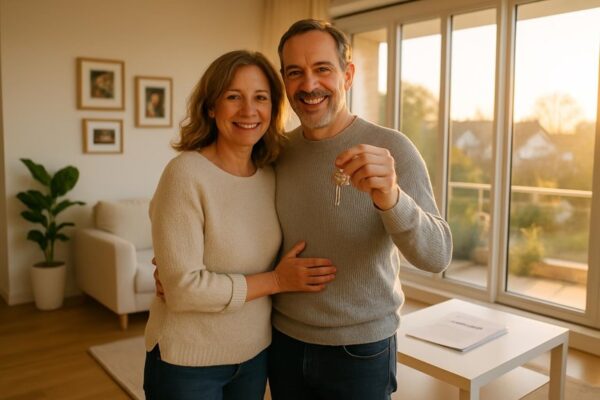Buying your first home is an exciting adventure, but it needs careful planning. First, look at your money situation. Check your credit score and see how much you can spend. Then, look at different types of mortgages to find the one that works best for you.
Next, make a list of what you really need in a home and what would just be nice to have. After that, learn about the neighborhoods you like. Check for nearby parks, schools, and how safe the area is.
It's also really helpful to have a good realtor. They can help you understand the market and negotiate prices.
Don't forget to get a home inspection. This will help you find any problems with the house.
Finally, learn some negotiation skills. This will help you get the best deal.
By following these steps, you'll make smart choices and have a great home-buying experience!
Ready to start building equity in your own Michigan home? Get your personalized home loan quote today.
Assess Your Financial Health

Before you start looking for your first home, it's really important to check how you're doing with your money.
First, take a good look at your budget. Write down how much money you make each month and what you spend it on. This will help you see how much you can spend on a house without making life hard for yourself.
Next, think about your credit score. This number is super important because it helps banks decide if they'll lend you money for a house and what interest rate they'll give you.
Make sure your credit report is correct. If there are mistakes, fix them. If your score isn't great, try to pay off debts and pay your bills on time. This can help your score go up.
Michigan residents, unlock the door to your new home. Request your home loan quote from Treeside Financial today.
Explore Mortgage Options
Getting a mortgage can feel a bit scary at first, but learning about your choices can help you make smart decisions. Start by thinking about two main types of mortgages: fixed rates and adjustable rates. Fixed rates mean your monthly payments will stay the same. Adjustable rates might start lower, but they can change over time.
You can also look at government loans. These loans can have lower interest rates and may need less insurance. Private lenders give you other options too, but the terms can be very different.
Here's a simple chart to help you understand:
| Option | Good Things | What to Think About |
|---|---|---|
| Fixed Rates | Payments stay the same | Might have higher starting rates |
| Adjustable Rates | Lower starting payments | Payments could go up later |
| Government Loans | Lower rates, less insurance | You need to meet certain rules |
Getting pre-approved for a mortgage is really important. It helps you know how much money you can borrow and what your payments will look like. In the end, picking the right mortgage that fits your money goals can help you feel at home in your new neighborhood.
You might be closer to buying your home than you think
Take our 2-minute home buyer readiness quiz to see how prepared you really are – no credit check required.

Prioritize Your Needs

When you buy a home, it's important to think about what you really need and what would just be nice to have. First, make a list of the things that are really important for you. This could be the number of bedrooms you want, how close you need to be to work, or what fun things are nearby.
These basics help make sure your new home fits your life now and in the future.
Also, remember that your needs might change later. You might want more space if you have a bigger family or need a good spot to work from home.
Research Neighborhoods Thoroughly
When you want to buy a home, it's important to learn about the neighborhoods. This helps you make a smart choice. Knowing about things like parks, schools, and safety can make a big difference in how happy you feel living there.
Here are some things to think about:
- Fun places: Look for parks, schools, stores, and how easy it's to get around on buses or trains.
- Safety: Check crime rates and talk to people who live there to see if it's safe.
- Home prices: Look at how home prices have changed over time. This helps you guess if the price will go up or down in the future.
- Community feeling: Visit the neighborhood at different times. See if the vibe feels right for you and your family.
Doing this research will help you find a great place to call home!
Hire a Skilled Realtor

Finding the right home can be tricky, but a good realtor can make it a lot easier. They know a lot about homes and the market. This means they can help you figure out how much houses are worth and help you get the best deal. A realtor is like a friend who knows all about buying homes. They make you feel welcome in the real estate world and treat you like family on your journey to find a new place to live.
| Benefit | Description |
|---|---|
| Realtor Experience | They help you step by step. |
| Market Knowledge | They know the latest trends. |
| Negotiation Skills | They help you get a great deal. |
Work with a realtor to feel confident and find your perfect home!
Conduct a Home Inspection
A home inspection is an important step when buying a house. It helps you learn about the house's condition and find any problems that might affect your investment.
When picking an inspector, make sure they're certified and know how to spot common issues like:
- Cracks in the foundation: These can cause big problems for the house.
- Roof issues: If not fixed, they can lead to expensive repairs.
- Electrical problems: These can be dangerous and mightn't follow the latest safety rules.
- Leaky pipes: These can cause water damage and mold.
Getting a home inspection can help you feel safe. It shows that you're making a smart choice.
Master Negotiation Techniques

After you check out the house, it's time to talk about the price. This is called negotiation. It helps you get the best deal for your new home.
To do this well, first, think about why the seller wants to sell. Do they need to sell fast or do they want to get a lot of money? This can help you decide how much to offer.
Look at prices of other similar homes to see if your offer makes sense. Be strong with your offer, but also be ready to change it a little if needed.
If the seller gives you a counteroffer, don't worry! This shows that you care and understand what's going on in the market.
Remember, you want both you and the seller to feel good about the deal. This will help you feel happy in your new neighborhood.
With these tips, you can negotiate with confidence and make sure your new home is a great choice!








